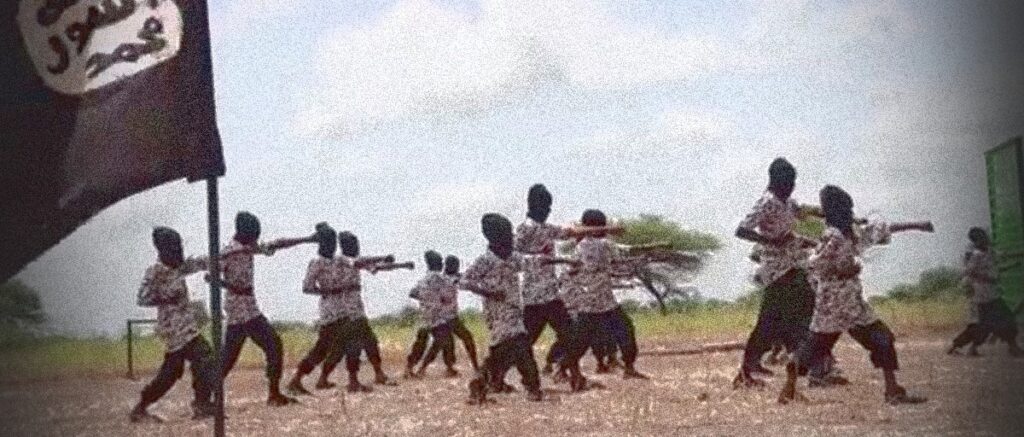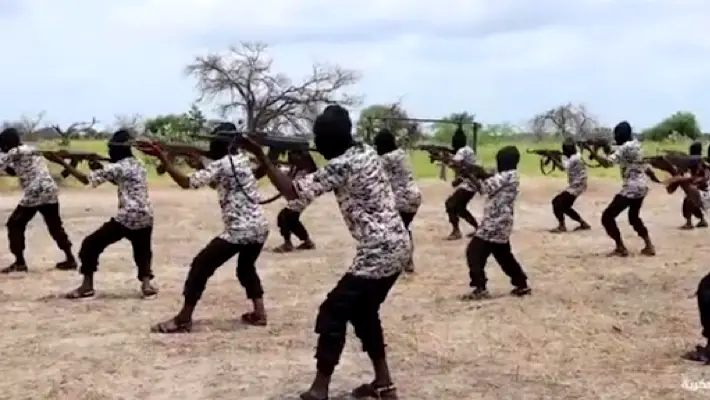•Schools have always been a primary Boko Haram target; now both its factions are using boys in combat.
By Malike Samuel and Oluwole Ojewale
In January, the violent extremist group Islamic State West Africa Province (ISWAP) released a video showing young boys undergoing strenuous combat training. As the clip ends, some children are seen executing soldiers captured from the battlefield. One of the instructors explains that the boys are being prepared for graduation and deployment.
The recruitment and use of child soldiers by the Boko Haram faction Jama’tu Ahlis Sunna Lidda’awati wal-Jihad (JAS) is widely known. However it’s been unclear whether ISWAP, its rival faction, has been doing the same. It seems ISWAP’s supposed strategy of not targeting civilians has deflected attention from its recruitment of young boys.
This is the latest in a long list of abuses of children, who have been particularly hard hit by the Boko Haram crisis. Many have been subjected to grave human rights violations, including kidnapping, slavery, starvation, rape, denial of access to formal education, and death.
According to former Boko Haram members, as many as 200 young boys starved to death in the group’s training and radicalisation camps – Darul Quran – before Boko Haram split into two factions in 2016. The late leader of JAS, Abubakar Shekau, once said he didn’t care if 100 000 children died.
ISWAP’s strategy of not targeting civilians has deflected attention from its recruitment of boys
With the Nigerian military’s tactical preference for air raids against terrorists, there’s always a risk that children will become battlefield casualties. The Nigerian Air Force has been involved in the deaths of several civilians, including children, during air raids since the insurgency started.
The ill treatment of civilians, notably the use of youngsters in combat, the enslaving of women and girls, and starving children to death were among the reasons for Boko Haram’s split. ISWAP criticised Shekau in particular for causing many children’s deaths. One would expect ISWAP to act differently, but recent losses of fighters in battle, clashes with JAS and members’ desertion may have compelled it to rethink its stance on child soldiers.
Institute for Security Studies (ISS) research shows that about 200 young boys graduated from Darul Quran in early February. In the ISWAP video, instructors noted that the group had similar training camps in different locations. Those familiar with the programme told the ISS about 50 such camps on the Lake Chad islands, where youth from Cameroon, Chad, Niger and Nigeria were present.
The video, which also shows children being well fed, was perhaps aimed at attracting others to join, but the reality is different, former child soldiers told the ISS. They said conditions in the training camps are dire – characterised by abuses such as whipping or hitting of boys, starvation, exhaustion and lack of sleep.
Education is one of Boko Haram’s primary targets with 5 000 classrooms razed in Nigeria since 2009
Children deemed to be slow learners or not fit to be trained are treated as slaves and assigned non-combat roles. They are deployed to commanders’ homes, where they perform tasks such as fetching firewood and water, doing laundry and delivering messages to other villages. They are also deployed to the battlefield as cheerleaders and are called Jundullah (Soldiers of God) to make them feel important.
ISWAP’s latest move has implications beyond the Lake Chad Basin. As one of the biggest and most successful Islamic State of Iraq and Syria (ISIS) affiliates, both in terms of the number of fighters and successful attacks, other ISIS affiliates may be looking to ISWAP for inspiration.
Already there are links between ISWAP and ISIS affiliates like the Islamic State in the Greater Sahara (ISGS) and the Islamic State in Central Africa Province (ISCAP). ISGS members play important roles in facilitating ISWAP fighters’ movements in and out of the Lake Chad Basin.

In January, the violent extremist group Islamic State West Africa Province (ISWAP) released a video showing young boys undergoing strenuous combat training.
Sources say ISIS sent two ISGS members to train ISWAP on how to share the spoils of war among fighters, particularly weapons, and retrieve these from fighters in exchange for money. Ongoing ISS research also reveals a bourgeoning relationship between ISWAP and ISCAP, starting with commanders from both groups exchanging ideas via video calls.
Children who disengage from Boko Haram are as much victims as the communities themselves
Governments and other stakeholders in the region need to urgently prevent more children from being recruited. This requires preventive instead of reactionary responses, based on an understanding of the conditions that enable children’s recruitment, such as a lack of formal education and livelihoods. Education has been one of Boko Haram’s primary targets, with 5 000 classrooms razed in north-east Nigeria since the insurgency in 2009.
Nigeria’s government should bring back the Safe Schools Initiative, initially aimed at ensuring access to education and learning in a secure environment during conflict and emergencies. Other Lake Chad Basin governments should consider this policy, given the regional nature of the Boko Haram crisis.
Military operations must avoid child casualties and aim to rescue children from Boko Haram. Planning, reconnaissance, and cooperation with communities will be needed to achieve this.
Using radio and other mass media programmes is important. Child soldiers who have left Boko Haram told ISS that radio broadcasts and leaflets encouraging people to go played a role in their disengagement. Such programmes could include former child recruits who share the difficulties they faced in the camps and discourage other children from joining.
Community consultations are the anchor for any strategy to address child recruitment. Without this vital step, interventions will be less effective, and former recruits may be stigmatised and rejected.
Communities need to be made aware that children who disengage from Boko Haram are as much victims as those targeted by violent extremist attacks. This would encourage more children to leave the group, facilitate their reintegration and prevent recidivism.
Malik Samuel, Researcher and Oluwole Ojewale, ENACT Regional Organised Crime Observatory Coordinator – Central Africa, ISS Regional Office for West Africa, the Sahel and the Lake Chad Basin
Credit | ISS

